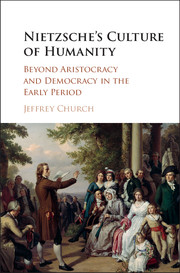Book contents
- Frontmatter
- Dedication
- Contents
- Preface
- List of abbreviations
- Introduction
- PART I The Foundation of Culture in the Early Nietzsche
- Part II Two Concepts of Culture in the Early Nietzsche
- PART III The Means to Culture in the Early Nietzsche
- PART IV The Significance of the Early Period
- 9 From Nietzsche's Early to His Late Period
- 10 Culture as Identity, Culture as Individuals
- Bibliography
- Index
9 - From Nietzsche's Early to His Late Period
from PART IV - The Significance of the Early Period
Published online by Cambridge University Press: 05 October 2015
- Frontmatter
- Dedication
- Contents
- Preface
- List of abbreviations
- Introduction
- PART I The Foundation of Culture in the Early Nietzsche
- Part II Two Concepts of Culture in the Early Nietzsche
- PART III The Means to Culture in the Early Nietzsche
- PART IV The Significance of the Early Period
- 9 From Nietzsche's Early to His Late Period
- 10 Culture as Identity, Culture as Individuals
- Bibliography
- Index
Summary
In this book, I have defended a meritocratic interpretation of Nietzsche. We may think of Nietzsche's early period view as located between the extremes of two other famous “meritocrats,” Plato and J. S. Mill. Unlike Plato's Republic, with whom Nietzsche's views are often compared, Nietzsche does not support a hierarchical class structure. Instead, Nietzsche defends institutions and culture that foster national unity and interdependence, such as a universal system of education. At the same time, unlike Mill, with whom Nietzsche is also often compared, Nietzsche does not counsel each individual to engage in “experiments in living.” Instead, Nietzsche insists that human excellence is rarely achieved and encourages the many to emulate the few rather than devote themselves to personal idiosyncrasies. What makes the early Nietzsche's view so interesting and unusual is that he consistently aims to steer a course between aristocratic and democratic alternatives. Since he adopts features of both alternatives, it has been easy for Nietzsche interpreters to align him either with the “aristocratic Plato” camp or with the “democratic Mill” camp. My aim in this book has been to restore the more innovative and capacious thinker.
In the final part of this book, I turn from the reconstruction of Nietzsche's early view of culture to an assessment of its significance. This chapter anticipates a challenge from readers familiar with the mature Nietzsche's writings: Didn't Nietzsche change his views over time? Doesn't he come to advocate more clearly an aristocratic social and political structure, a “rank order” of human beings, and a project of discipline and breeding? Since Nietzsche left behind his youthful meritocracy, this objection goes, there must have been something fatally flawed about it. What, then, is the significance of these early views?
In this chapter, I argue that Nietzsche did not change his positive ethical view fundamentally from his early period to his late. To make this case, I interpret a few famous late period aphorisms – especially aphorisms that have been marshalled as evidence for the “aristocratic radical” Nietzsche – and show how they can be better understood within the meritocratic theory I have outlined in this book. In particular, I will discuss these aphorisms under the heading of four key themes – nihilism, redemption, the relationship between the few and the many, and the state – that together have constituted the core of my discussion of Nietzsche's early view of culture.
- Type
- Chapter
- Information
- Nietzsche's Culture of HumanityBeyond Aristocracy and Democracy in the Early Period, pp. 231 - 245Publisher: Cambridge University PressPrint publication year: 2015



